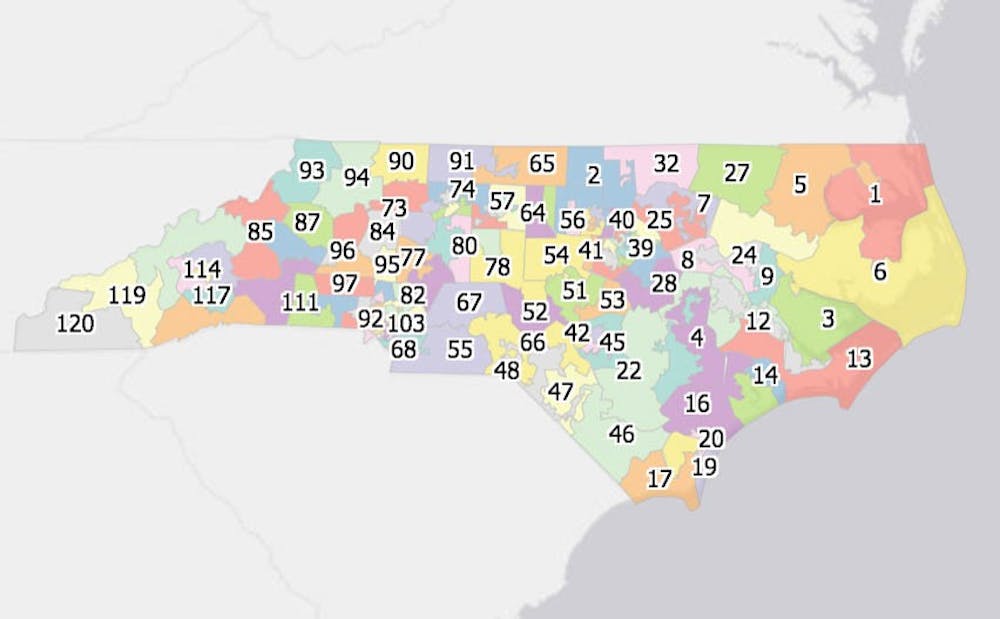The U.S. Supreme Court voted last week to uphold most of North Carolina’s newly drawn state legislative districts, marking the end of one of the state's gerrymandering lawsuits.
The per curiam ruling ends a long-running battle over the 2011 state elections map—which was drawn by Republican lawmakers—and its court-ordered successor map. It also ensures that North Carolinians will vote in the same districts as they did in the May primary for the upcoming midterm elections.
“Thanks to the dedication of the plaintiffs in this case, voters in North Carolina will finally be able to vote in state legislative districts drawn without unconstitutional racial discrimination,” said Alison Riggs, senior voting rights attorney for the Southern Coalition for Social Justice, in a statement. “The order from the Supreme Court today sends the message loud and clear that discrimination, even if hidden under a self-proclaimed veil of ignorance, will not be tolerated in the redistricting process.”
The Supreme Court’s decision largely affirms the maps created by Nathaniel Persily—a Stanford Law School professor and the “special master,” or designated expert, in the case. In January, a three-judge panel hired Persily to redraw the districts after it found that the Republicans’ second attempt in 2017 was still racially tainted.
In addition to North Carolina, Persily has also crafted election maps for Georgia, Maryland, Connecticut, New York and Pennsylvania.
“The District Court had its own duty to cure illegally gerrymandered districts through an orderly process in advance of elections,” the high court ruled. “We conclude that the District Court’s appointment of a Special Master in this case was not an abuse of discretion. Neither was the District Court’s decision to adopt the Special Master’s recommended remedy for the racially gerrymandered districts.”
Notable exceptions were the districts in Wake and Mecklenburg counties—where Raleigh and Charlotte are located, respectively. The maps in those counties will remain unchanged for the upcoming state elections.
The legal battle stems from an earlier case in which retired schoolteacher Sandra Covington and 30 other North Carolina residents—including Rev. Julian Pridgen, M. Div. ’09, and current Durham City Council member DeDreana Freeman—sued the state, the leaders of the redistricting committee and the state board of elections.
The residents argued that argued that Republican lawmakers had illegally relied on race to redraw the state’s legislative map, packing black voters into just a few districts and weakening their influence.
“I feel discriminated against because [legislators] falsely assume black people only vote for black candidates and white people only vote for white candidates,” Covington told The News & Record in April 2016. “I was plucked out of my district simply because of race.”
After North Carolina’s Middle District Court deemed the map illegal and ordered the state to redraw its districts, the challengers of the 2011 map claimed the lawmakers’ second attempt was still unacceptable—a claim that the court upheld, leading to Persily’s appointment.
The map, which will be used in state elections this November, redraws four state house and senate districts, mostly in urban counties that tend to favor Democrats.
The Republican Party currently controls both chambers of the General Assembly in numbers that allow them to override Democratic Gov. Roy Cooper’s vetoes.
“North Carolina Republicans threw a Hail Mary to the courts because they’re afraid to run in fairer districts,” said Wayne Goodwin, the chair of the North Carolina Democratic Party, to The Herald Sun. “Democrats are ready to break the super-majority this fall and bring common sense back to Raleigh.”
The ruling is unrelated to other ongoing Supreme Court cases about gerrymandering in North Carolina—including last week’s 9-0 decision to invalidate a lower court’s ruling that lawmakers had unfairly drawn the state’s congressional districts to favor Republicans.
The electoral maps are redrawn every decade to reflect new census data, and the maps will likely change again before the 2020 elections.
The court's full opinion for the case is included below.
Get The Chronicle straight to your inbox
Signup for our weekly newsletter. Cancel at any time.

